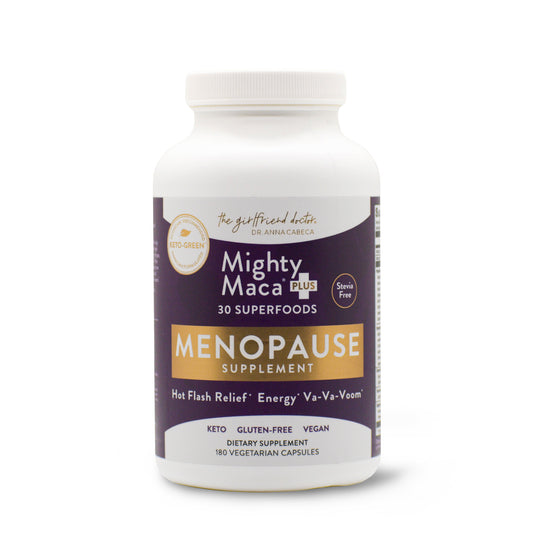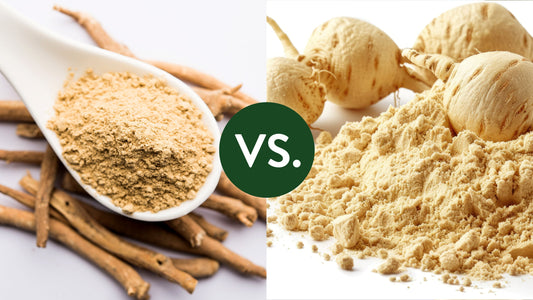Have you heard about maca’s weight loss potential? Because my favorite root from Peru is getting some attention lately as a weight loss herb. Now, don't get me wrong, maca isn't some magical pill that'll melt the fat away overnight. But, it's got some pretty neat ways of helping support you on your weight loss journey.
While direct evidence linking maca to weight loss is still emerging, there are a few ways maca root could help with weight loss.
In this article, we’ll explore:
- Maca's ability to control blood glucose levels (which can be crucial in managing body weight)
- How maca can help increase energy levels (hello, easier workouts!)
- Maca’s impact on hormone regulation, especially in menopause, which can contribute to weight loss in a holistic way
- Why stress impacts your weight and maca’s potential for stress support
Allow me to shed some light on how maca could be a game-changer in your weight loss journey.

Just so we’re clear…if you currently exist on a strict diet of donuts and soda and you start taking maca to lose weight and change nothing else about your lifestyle…it might not help you much in the weight loss department.
After all, a holistic weight loss approach is usually the best.
However, when it’s part of a weight loss plan that includes a healthier diet and some exercise, maca is a standout.
I’ve personally used maca root for weight loss — dropping over 70+ pounds and keeping it off, even throughout my second round of menopause.
And I’ve personally seen thousands of my patients use maca with great results over the years.
Let’s discuss how maca can help with weight loss and how it works.

At the top of the list of potential maca benefits for weight loss is blood sugar support.
Again, do we have tons of double-blind, placebo-controlled studies showing a direct link in humans between maca and weight loss? No, no we don’t. But some studies do show promise.
A few studies have shown maca could improve glucose metabolism in animal models, even those with diabetes. These studies also point to the antioxidant activity of maca as well — suggesting that maca could not only help in glucose regulation but also potentially provide cellular protection against oxidative stress. (1-4)
When your body’s normal blood sugar response becomes impaired (like we see in insulin resistance and diabetes), your cells cannot effectively remove glucose from your bloodstream.
So instead, your body stores that extra glucose in your tissues as fat. This leads to weight gain.
By supporting glucose metabolism, maca helps get glucose into the cells where it belongs — which in turn could reduce the amount of fat your body stores.

Another way maca could work to help you lose weight is because it can help you feel more energetic. (5-8) And it can even improve exercise performance. (9)
I just mentioned how when your blood sugar becomes dysregulated your cells can’t use glucose effectively. Well, this leads to feelings of fatigue as well as extra fat storage. Think about it — of course you’re going to feel tired if your food can’t power up your cells and give you energy!
Add blood sugar dysregulation into the menopause equation, and you’ve got a recipe for low energy. Plus, when you’re sitting at a desk all day at work, then sitting in the car on the way home…it leaves you with little desire to get moving.
Maca comes in handy here for several reasons. For one, it’s so nutritionally dense. It’s packed with nutrients and vitamins your body needs for fuel. It’s also potentially an anti-oxidant and a gut-health helper. When you add all of that together with the other benefits I’m discussing below, maca can be the extra helping hand you need to boost your energy so you can get your workout in.
Just imagine — instead of feeling run down and ready for a nap at 3 PM, you could have the energy to take a brisk walk. What could that do for your weight loss efforts?

It’s no secret maca can help balance your sex hormones in menopause.
But maca has also been found to support the regulation of other hormones, too, including Adrenocorticotrophic hormone (ACTH) and cortisol. ACTH is a hormone that tells your adrenals to release cortisol.
Now, cortisol is fantastic if you’re in a real emergency situation. It’s the stress hormone that can keep you out of danger. But when too much is circulating in your body and there’s nothing to actually panic about, it becomes a fat-storage hormone that slaps weight right on your belly. (10,11)
Since maca appears to reduce both ACTH and cortisol, it’s a fabulous partner for weight loss, especially in menopausal women.
In fact, one double-blind, randomized, placebo-controlled study found that when postmenopausal women took maca for four months, their BMI and blood pressure were significantly reduced, as well as their menopausal symptoms like hot flashes. Plus, the women in the study saw increases in their bone density markers too. (12)
There’s also some evidence to suggest maca could help regulate leptin, the hormone that helps you feel full. One recent animal study showed that leptin levels were increased in the subjects that were given maca. (13) This is another possible way maca could help you lose weight.
My Favorite Maca Powder Smoothie For Weight Loss
So, how do you get more maca into your life? How do you harness it’s weight loss powers for yourself?
I personally use maca powder in my morning maca smoothie for weight loss.
Here’s one of my favorite recipes:

Final Thoughts: Maca Root Weight Loss
I hope you’ve enjoyed this adventure, exploring what maca's got to offer when you want to shed a few pounds, especially in menopause. I know I’ve personally used it and loved it for years.
My favorite, of course, is my Peruvian-grown, organic maca powder in my Mighty Maca® Plus drink mix and capsules. I credit this blend with rescuing me from the depths of hormone hell, and it’s helped thousands of women all over the world improve their menopause journey and keep their weight in check, too.
Of course, maca’s most effective when it's part of your holistic health plan, along with good eats and regular exercise. And, of course, always chat with your doctor before you start any new supplement.
References
- https://www.ncbi.nlm.nih.gov/pmc/articles/PMC8194906/
- https://www.cabidigitallibrary.org/doi/full/10.5555/20113189500
- https://publishup.uni-potsdam.de/frontdoor/index/index/docId/7014
- https://www.sciencedirect.com/science/article/abs/pii/S2210803319300284
- https://www.ncbi.nlm.nih.gov/pmc/articles/PMC9608999/
- https://pubmed.ncbi.nlm.nih.gov/33729250/
- https://www.frontiersin.org/articles/10.3389/fnut.2022.1004174/full#h3
- https://pubmed.ncbi.nlm.nih.gov/27548190/
- https://pubmed.ncbi.nlm.nih.gov/19781622/
- https://pubmed.ncbi.nlm.nih.gov/27345309/
- https://pubmed.ncbi.nlm.nih.gov/16353426/
- https://www.ncbi.nlm.nih.gov/pmc/articles/PMC3614644/
- https://pubmed.ncbi.nlm.nih.gov/32951476/







